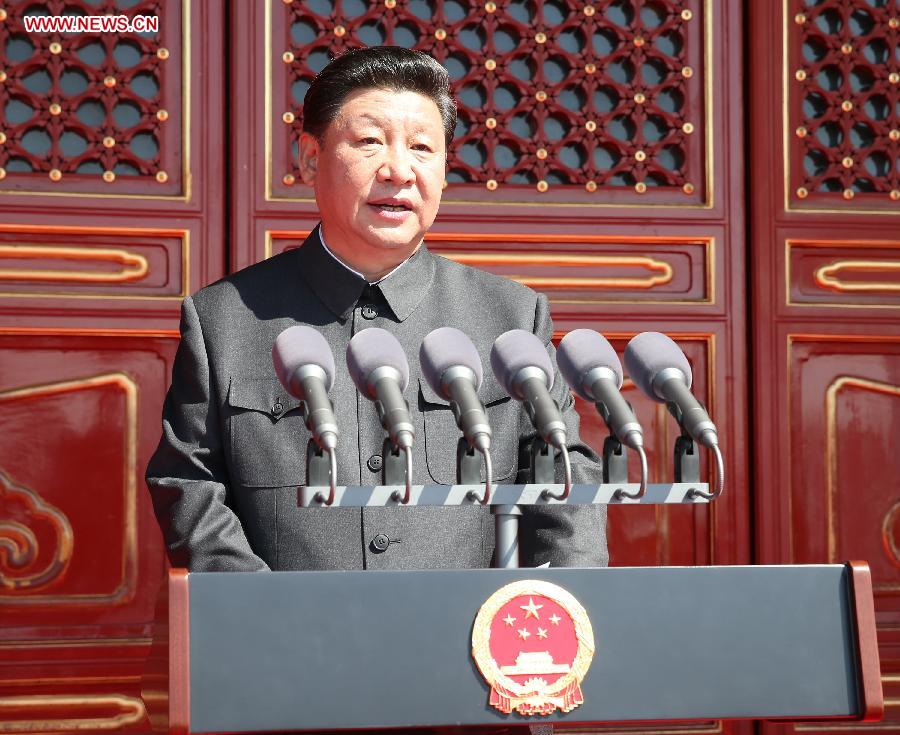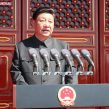
Chinese Military Parade Emphasizes Peace, Displays Military Might While Cutting Troop Numbers
Publication: China Brief Volume: 15 Issue: 17
By:

On September 3, China held a military parade commemorating the end of World War II (WWII). A departure from previous parades, which only took place on China’s October 1 National Day, this parade had a significant international focus, featuring troops from 17 countries, veterans of the war and large formations of troops, armored vehicles, missiles and aircraft (CCTV Online, September 3).
President Xi Jinping gave a speech commemorating the end of a war that for China lasted 14 years and saw 35 million Chinese casualties (Xinhua, September 3). Xi repeated China’s commitment to never seek hegemony or expansion (永远不称霸、永远不搞扩张) and to “uphold the outcomes of the war.” Interestingly, unlike Hu Jintao during the 2009 National Day parade, Xi did not mention Taiwan, cross-strait relations or upholding the principle of “peaceful reunification, one country, two systems” (People’s Daily, October 2, 2009). Though peace featured prominently throughout the speech, the twin themes appear to have been unity and strength.
Paying tribute to the international effort during World War II, Xi reiterated China’s commitment to peaceful development. After emphasizing the People’s Liberation Army’s (PLA) sacred mission of “protecting the nation’s security…and carrying out the noble mission of upholding world peace,” Xi almost casually announced a reduction of 300,000 troops. China has reduced troop levels before, but Xi’s announcement represents 13 percent of the current total of active-duty soldiers (approximately 2.4 million) and is the largest reduction since 1997 (CCTV, September 3; DOD, April 7; China News Online, September 3). Previous reductions, particularly those in the 1980s, accompanied significant modernization of the PLA.
This reduction, along with the PLA’s shift toward aerospace and maritime power and the rumored reduction in the number of Military Regions, will have a greater impact on the PLA than any single weapon system that was on display (Duowei, August 28). Reductions could allow Xi and the other heads of the Central Military Commission (CMC) to better combat corruption and the widespread selling of positions, a rampant problem that led to the investigation of former Defense Minister Guo Boxiong and CMC Vice-Chairman Xu Caihou.
Despite recent factional infighting that has put the president at odds with older cadres, Xi shared the stage with a number of previous top leaders, including Jiang Zemin, Hu Jintao, Li Peng, Zhu Rongji and Wen Jiabao. This was a deliberate display of Party unity in the face of questions about the central government’s response to China’s financial crisis and handling of the Tianjin Chemical warehouse disaster. The presence of Jiang Zemin alongside Hu Jintao during the 2009 parade celebrating the 60th anniversary of the founding of the People’s Republic was understood as undercutting Hu Jintao’s authority (China Brief, October 9, 2009).
Unity was a common theme throughout the parade and surrounding events. Politburo Standing Committee (PBSC) member Yu Zhengsheng and United Work Front Department Director Sun Chunlan headed a meeting that included representatives of Hong Kong, Macao and Taiwan. Lifting the curtain on some of the central government’s more pressing economic concerns, Yu Zhengsheng used the call for unity to encourage Chinese compatriots abroad to contribute through investment, technology and skill and “share in the homeland’s development” (Xinhua Online, September 2).
Though largely for a domestic audience, the parade also served important foreign policy goals. The parade was attended by 30 heads of state and representatives from 59 nations and organizations including the United Nations (MFA, August 25; State Council Information Office, August 30). The image of Russia’s Vladimir Putin and South Korea’s Park Geun-hye striding up the steps of Tiananmen Gate, flanking President Xi, sent a strong message about China’s diplomatic priorities. Both Putin and Park have used the event as a chance to improve relations with Beijing.
Putin is hoping to build a stronger relationship with China, inviting Chinese troops to participate in a recent series of exercises in Russia’s Far East and promising to continue building economic links through the Eurasian Economic Union and Silk Road initiatives (Eurasia Daily Monitor, August 31; MFA, September 3).
In a meeting with President Park the day before the parade, Xi emphasized China’s commitment to the goal of a denuclearized Korean Peninsula and the voluntary reunification of North and South Korea (MFA, September 2). The weight of World War II hangs heavily on Korean politics. A recent survey of public opinion in Asia reflects South Korea’s closer relations with China, with Koreans favoring China to Japan 61 percent vs 25 percent (Pew, September 3).
The United States was represented by Ambassador Max Baucus, a point that an editorial by the Global Times called “barely sufficient,” stating that the U.S. had simply “chosen to consider its allies feelings” over attending (Global Times, September 2). United States National Security Advisor Susan Rice had previously visited Xi Jinping at the end of August, ahead of Xi’s upcoming visit to the U.S. (People’s Daily, August 29).
Though the end of World War II did not mark the end of Chinese internal strife, it was a watershed moment in modern Chinese history. The CCP continues to frame itself as the primary force behind the end of the war (Seeking Truth, August 31). Though “not directed at any specific country,” it is hard not to see the months-long focus on Japan’s transgressions and subsequent military parade has having a more modern subtext (MFA, August 25). Amid the nationalistic chest thumping, glistening tanks and precise marching, a real highlight of the parade was the honoring of veterans of the war from the U.S., Russia, China and Taiwan—many of whom are in their 90s. Whatever the political reasons behind China choosing this, the 70th anniversary, to specially celebrate the end of the war, it is likely that few of these veterans will remain for future major anniversaries.




